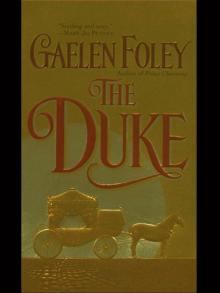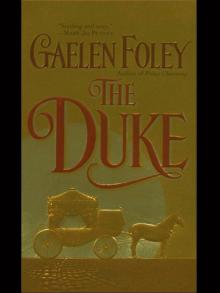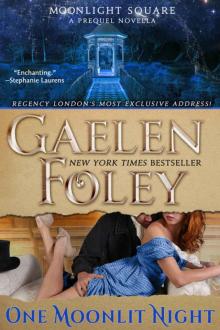- Home
- Gaelen Foley
His Wicked Kiss Page 3
His Wicked Kiss Read online
Page 3
Jack eyed the youth in sardonic amusement as he set the gun aside; he, too, had thought himself invincible at that age. “Word of advice,” he offered Don Eduardo. “Keep that pup of yours away from the battlefield. He’s much too green and bent on glory.”
“Easier said than done, my friend.” With a cordial chuckle, Don Eduardo clapped him on the shoulder. “Come inside and have a drink.”
They strolled into the luxurious villa, where floor-to-ceiling windows overlooked the terrace. Filmy curtains wafted in the night breeze, cooling the stately drawing room. The elegant furnishings and gilt-framed oil paintings might have easily placed the home in London, Paris, or Madrid, but they were many miles from any such civilization now. The capital of Caracas, a couple hundred miles away, was the nearest city, but situated on the coast, it had fallen back under the control of the Spanish empire. The rebels held control of the interior, however, and had made the hot colonial settlement of Angostura their stronghold.
The town reminded Jack a bit of New Orleans—another place where he had gotten into more than his share of trouble. Beyond its low hills, abundant flowers, and shady live oaks covered in Spanish moss, stretched endless miles of flat tidal plains called the llanos; until finally, the mighty Orinoco, Venezuela’s watery highway, slipped into shadowed jungle, before emptying into the sea.
“How long will it take you to reach England, Lord Jack?”
“Four to six weeks, depending on the winds.”
“You will be pleased to hear that Bolivar means to award you with ten thousand acres in rich cattle land as a token of his thanks when the war is won.” Montoya cast him a shrewd glance, as he checked the label on a bottle of port by the flickering light of the pewter candelabra.
Jack stared at him. “That isn’t necessary.”
“Ah, but we are very grateful for the help you have promised our cause, my lord. See for yourself.” Finished pouring the port, Montoya took out a map, unfurled it on the table, and leaned closer to inspect it, nodding at Bolivar’s signature. “The Liberator has etched the boundaries of your holdings here. We wish you to accept it—as a gift.”
“Let me see that.” Jack narrowed his eyes. With the flat of his dagger, he traced the outlines of the land he was to be given at their leader’s behest, but his lips twisted in a cynical half smile.
A bribe.
So. They didn’t trust him. He was a little offended but not altogether surprised. His lashes flicked downward as he glanced over the map, but he mentally shrugged off the insult. He did not need their money or their land, but if it put their minds at ease, he could pretend to take the bait. Far be it from Black-Jack Knight, after all, to do anything out of the goodness of his nonexistent heart.
Besides, there were vast profits to be gained if this brash plot succeeded, opening up the continent to trade.
For centuries, Spain had had a chokehold over South America, jealously guarding her rich colonies with ironclad monopolies.
If Bolivar managed to cut South America free of her chains, then the risks that Jack was now taking to come to their aid would ensure that Knight Enterprises would be among the first outside companies to establish favorable trading agreements with the newly independent nations.
Unfortunately, the colonists hadn’t a prayer of winning this fight unless they received reinforcements—and soon.
The rebels had plenty of silver. What they lacked was men. Jack, however, based in neighboring Jamaica, knew exactly where to find this commodity in abundant supply, namely, the half-pay heroes of Waterloo.
Pouring back into England after winning the war against Napoleon, countless thousands of British soldiers were arriving home only to find there was no work for them, no way to feed their families. Throughout England, Scotland, and Ireland, there was a surplus of skilled and battle-hardened warriors, many of whom would be willing to fight as mercenaries in South America, especially since Bolivar’s cause could be called noble, if a man cared for such things.
There was only one small snag. Parliament had just issued a decree forbidding British soldiers from going and joining the fight. Obviously, Englishmen fighting alongside Venezuelan rebels to divest Spain of her colonies would have raised many an eyebrow in Madrid.
Having just extricated the nation from twenty years of war against France, the last thing the Foreign Office wanted was fresh trouble with the Continental neighbors—this time, Spain.
But if Jack knew one thing about soldiers—which he did, having a bona fide war-hero amongst his brood of brothers—it was that they were practical men. Loyalty to king and country only went so far; you could take a soldier’s arms and legs and blow his bosom friends to smithereens, but you did not trifle with his family.
No self-respecting warrior who had helped to thrash the Grande Armée was going to stand by and let his children starve, not when he could take up his musket and sword and earn excellent pay in South America.
All it took was someone with the right connections, high and low, the nerve, the discretion to recruit said mercenaries without attracting the notice of the British government, the ships to bring the two parties together, and the ability to slip a few thousand troops past the Spanish blockade.
That was where Jack came in, but nobody had to know that he actually cared.
He looked up from the map, nodded his acceptance of their offering, and took a large swallow of port.
Montoya’s face flooded with relief. “We have a deal, then? You will bring us men?”
He let out an appropriately mercenary laugh. “Men?” He slapped Montoya’s shoulder with a wolfish glint in his eyes. “Tell Bolivar that I will bring you devils.”
Some time later, Jack walked through the darkened guest apartment he’d been assigned for the night, wearily unbuckling his pistol holster and tossing aside his knife belt in turn.
He pulled off his black jacket and dropped it on the large bed as he sauntered out onto the balcony, feeling restless.
Resting his hands on the black wrought-iron rail, he stared out over the river, trying not to think about all he stood to lose if things went badly. His freedom. His company. Possibly his neck. None of that bothered him, though, as much as the prospect of facing a world again that he had walked away from a long time ago. A world that had not wanted him.
His mind drifted off across the darkened landscape, far away, toward his destination over the sea…to the green, rolling, patchwork fields of his native England.
Every muscle in his body clenched. A steadying exhalation escaped him quietly. It was hard to believe that in a few weeks’ time, he would set foot on English soil again, after his long, long exile. Nothing but the threat of this slaughter practically in his back garden could have induced him to return.
He’d have to see his brothers again, he supposed, and of course, one could not forget Maura.
His face hardened. Perhaps when he saw her again after all these years, he could ask her if marrying the marquess had been worth it.
Turning away from the railing, Jack prowled back into the unfamiliar chamber and shrugged off his waistcoat, tossing it willfully aside, along with his troubled thoughts. Hot bloody night. How was a man supposed to sleep? He was spoiled, he guessed, by the cool ocean breezes at his elegant white-stuccoed villa in Jamaica.
His principal home sat high on a cliff overlooking the sea. It was a short drive into Port Royal, where his company, Knight Enterprises, was headquartered. This was the home he had made for himself, he thought, though a part of him had yet to be convinced that he actually belonged anywhere on earth.
As he lifted his loose linen shirt off over his head, a timid knock sounded at the door.
“Aye?”
Jack waited, expecting some last-minute reminder from Trahern on the shipment of tropical hardwoods they’d be collecting in the morning before they set out—the rare ze-brawoods in particular were going to fetch a steep price on the London markets—but when the chamber door opened, his eyebrow lifted.
&nb
sp; The pretty señorita from the terrace peeked in, carrying a water pitcher in one hand and a stack of freshly folded towels in the other. “I-I have these things for you, sir,” she said in the sweetest little accent.
It turned his blood to honey. A narrow smile crept over his face. “Come on in, darlin.’” He stared hungrily at her, stunned all over again by these local goddesses. In brooding speculation, he watched her carry the items over to the mahogany washstand. She sent him a shy but sultry smile.
Four to six weeks at sea…no woman to warm his bed.
Jack reached into the pocket of his discarded coat for a few gold coins, fully prepared to make it worth her while.
She must have felt his study, for she glanced over her shoulder at him, her curious gaze flicking down his bare chest, over the thick muscles, work-hardened contours, and assorted scars on his body.
He lifted his chin, offering himself for her pleasure without a word. The girl swallowed hard, clearly interested, but perhaps also intimidated by his size and the bruiser’s build that he had inherited from his real father, a champion prizefighter; she was, he guessed, more accustomed to the wiry body of that no doubt overeager boy.
“I don’t bite,” he whispered with a shadowed smile.
But perhaps she liked what she saw, for when he crooked his finger at her slowly, she approached with cautious steps.
“Will there be—anything else, my lord?” she asked a trifle breathlessly.
He nodded, staring, and pressed the gold into her hand. The girl trembled but uttered no protest as he began gently unlacing her bodice.
CHAPTER
TWO
The next morning, Papa and Connor set out early to visit the Waroa settlement a few miles away in hopes of finding an Indian guide who might be willing to take them into the Amazon.
Eden prayed the Waroas had more sense than her genius father. Perhaps Papa’s friend, the shaman, might even talk him out of this mad plan, for most tribes in the region dreaded as much as the whites did the fierce Yanomami who ruled the Amazon forest. They were said to make a soup out of the enemies they killed.
The more she thought about it, the more she feared her sire was truly fixed on his own destruction, perhaps without even realizing it. Perhaps death really was his underlying plan—to be all the sooner reunited with Mama. She worried over this morbid possibility all morning as she went about her usual list of chores: managing breakfast, giving the servants their daily instructions, checking supplies, taking down the instrument readings and recording them in the logbook: temperature, barometric pressure, and lastly, the river’s current depth.
For this final item, she followed the plank-and-hemp boardwalk from their camp down to the little rickety dock that the men had constructed. Along the way, she found solace in the morning breeze that rustled gracefully through the palm fronds, and swayed the hanging vines and lianas.
Tilting her head back, she watched blue and gold and scarlet macaws swoop overhead, spiraling through the canopy like living fireworks. Three stories overhead, a spider monkey swung from branch to branch with its baby clinging to its back. Closer to earth, a large, sleek aguti dug in the soil with its long front claws, trying to pull up a root for its breakfast, and snuffling in the dirt with rodent pleasure. Eden watched it for a moment, rather amused, then continued on her way.
A big blue dragonfly zoomed across her path as the boardwalk rounded the giant buttressed roots of a native mahogany tree. Nearing the riverbank, she paused to scan the surrounding area before walking out onto their shaky private dock: She had no intention of becoming anything’s breakfast.
Finding the way clear, she proceeded out to where three dugout canoes were tied, bobbing in the lazy current.
Making her notations, she squinted at the marker-pole that Connor had sunk into the river mud some ten feet from the bank. It served as a huge ruler. Twenty-five feet. Low today, even for the dry season.
She marked the reading with her pencil in the logbook.
A sudden spray of water nearby startled her, but then she smiled, alerted to this visit from one of the mysterious pink dolphins that inhabited the river. Magical creatures, invisible in the aqua negra. She crouched down, scanning the murky shallows. Her smile broadened as she caught a glimpse of a coral-pink tail fin.
The Indians called these animals Buoto and believed they were really sorcerers in dolphin form, who dwelled in a golden kingdom that existed underneath the river. Whenever a baby was born in the village to a girl with no husband, the elders proclaimed it the work of a Buoto who had changed himself by enchantment into a handsome young warrior and had sneaked into the village to find a wife. The Buoto were infamous for their amorous ways when they transformed themselves into men. Fortunately for Eden’s virtue, the pink dolphin was gone again as swiftly as it had appeared.
Satisfied with her notations, she returned to camp to finish with her list of morning chores.
Upriver at Angostura, Jack received his delivery of rare tropical hardwoods from the local timber dealer and personally oversaw the laborious process of attaching the barge piled with felled trees to the wide, flat-bottomed river craft he had hired.
When all twenty crewmen from his gunship were accounted for, he shook hands on the dock with Don Eduardo.
“Safe journeys, Knight.” Montoya followed Jack’s upward stare to the balcony of the guest apartment, where the dark-haired girl, wrapped in a bedsheet, languidly waved farewell from the wrought-iron railing.
Jack blew her a kiss.
“You may take her with you if you like,” his host said in discreet amusement. “At least it would keep her out of my son’s clutches.”
“God, no.” Jack flicked him a wry look. “A woman at sea? Nothing but headaches.” With that, he jumped into the sturdy riverboat, an odd-looking hybrid of steam and sail, but serviceable.
Don Eduardo sauntered to the edge of the dock as Jack’s men tugged the ropes free from their mooring posts. He sent them a final salute as Jack gave the order to set sail.
When his men poled the craft away from the docks and out into the middle of the river’s slow but powerful current, Jack set his gaze straight ahead, not sparing one look back at the woman he had ravished so thoroughly last night.
Such was a sailor’s fate. The trick, of course, was never to stay in one place long enough to get attached. And that was just the way that Jack preferred it.
He spent the first hour of their journey keeping an eye on the local pilot he had hired to navigate them down the unfamiliar river. He knew enough about the sea to realize that a wise man treated a great river like the Orinoco with extreme respect. He always preferred local guides in his travels, and as the swarthy mestizo captain of the riverboat got them off to a smooth start, Jack went to check on the lumber, and got a splinter for his pains. Finally, with their downriver voyage well underway, he decided that he could relax for a while.
With Trahern leaning nearby, gazing at the wide, sun-drenched river ahead, Jack settled in for the day-long ride with a copy of Angostura’s first official newspaper, recently established by Bolivar. Reclining in a battered wooden chair inside the cramped pilothouse, he put his feet up, crossed his booted heels, and chewed on an unlit cheroot.
“I still don’t see why you didn’t insist that they pay you silver,” Trahern said to him at length in English, which their pilot did not understand. “You could sell it on the currency market in China, and your profit is fifty percent.”
“Chris, relax. We’re already running a perfectly adequate silver trade out of Buenos Aires.” It was smuggled silver, of course, but why split hairs? The English Crown turned a blind eye to the flourishing business of British smugglers in South America; after all, John Bull was painfully light in the pockets these days. “You have to be patient if you want to get rich,” he advised, turning the page of the newspaper before abruptly tossing it aside. “Utter tripe. Liberty this, liberty that. Naught but the usual propaganda.”
“But you love p
ropaganda, Jack,” Trahern said in amusement.
“Only when I’m the one using it. Bloody God, it’s hot. Open that window wider.”
Trahern obeyed. “Look!” He pointed to a group of colorful riders storming across the flat golden plains. “A band of llaneros.”
“Thank God Bolivar finally got them on his side, at least.”
“Something like a cavalry,” Trahern agreed with a shrug.
“At least they know how to fight,” Jack murmured. “They won’t run. And they know the territory.” He watched the rugged cattlemen of the plains driving their herds to fresh grazing.
After the impressive cavalcade had passed, he leaned back thoughtfully in his chair. “Think I’ll catch a bit of sleep for now. That girl wore me out.”
Trahern laughed. “Poor fellow.”
Jack grinned and tugged the brim of his straw hat down lower over his eyes; folding his arms across his chest, he stretched his long legs out before him and dozed. He hadn’t gotten much sleep last night—not that he was complaining—but he knew he’d need to be sharp when it came time to slip past the Spanish at the coast and rendezvous with his ship. The Winds of Fortune was hiding now in a cove near Icacos Point, a rocky peninsula that jutted southward off the island of Trinidad in the straits known as the Serpent’s Mouth.
He’d left his third-in-command, Lieutenant Peabody, in charge of the vessel, with Brody, the stalwart master-at-arms, to lend a bit of added steel to his orders. Nevertheless, being parted from his beloved vessel with the Spanish flotilla so nearby made him a tad nervous.
As soon as the Winds picked up Jack and his men, along with this small fortune in timber, they would set sail across the Atlantic, and ride the trade winds back to the British Isles.
It was midmorning by the time Eden was finished cataloguing the latest editions to her father’s ever-growing herbarium and making sure that all their recently pressed and dried botanical samples remained undamaged by the relentless humidity.

 My Ruthless Prince
My Ruthless Prince Paladin's Prize
Paladin's Prize Duke of Storm
Duke of Storm Duke of Scandal (Moonlight Square, Book 1)
Duke of Scandal (Moonlight Square, Book 1) My Irresistible Earl
My Irresistible Earl Lady of Desire
Lady of Desire Devil Takes A Bride
Devil Takes A Bride The Duke
The Duke The Duke: The Knight Miscellany Series: Book 1
The Duke: The Knight Miscellany Series: Book 1 Her Secret Fantasy
Her Secret Fantasy Her Only Desire
Her Only Desire Lord of Fire
Lord of Fire My Wicked Marquess
My Wicked Marquess My Scandalous Viscount
My Scandalous Viscount Duke of Secrets (Moonlight Square, Book 2)
Duke of Secrets (Moonlight Square, Book 2) One Night of Sin
One Night of Sin The Secrets of a Scoundrel
The Secrets of a Scoundrel Dream of Me (Harmony Falls, Book 1)
Dream of Me (Harmony Falls, Book 1) His Wicked Kiss
His Wicked Kiss One Moonlit Night (Moonlight Square: A Prequel Novella)
One Moonlit Night (Moonlight Square: A Prequel Novella) My Dangerous Duke
My Dangerous Duke